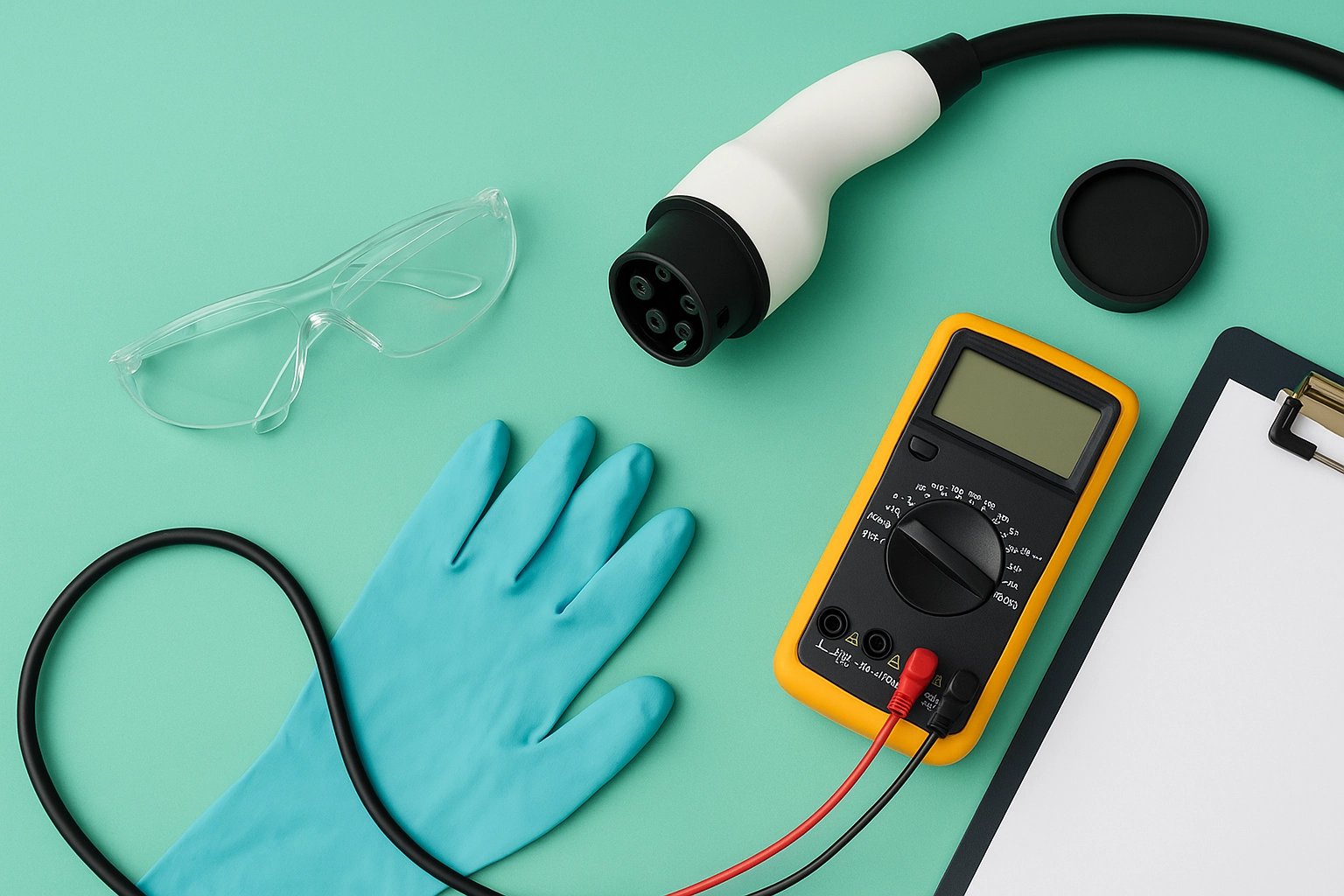SAE J3105 Overhead Conductive Charging Equipment Test
The SAE J3105 standard is a critical component in the evaluation and certification of overhead conductive charging equipment, which has become increasingly important as electric vehicle (EV) technology continues to evolve. This test ensures that charging systems meet rigorous performance criteria, enhancing safety and reliability while supporting global standards for EV infrastructure.
The SAE J3105 standard was developed to address the specific challenges associated with overhead conductive charging systems, which offer a unique set of advantages over ground-level chargers. These include reduced installation costs due to fewer poles required, increased efficiency through direct contact between the vehicle and the charger, and enhanced safety features such as automated disconnect mechanisms.
Our laboratory uses state-of-the-art facilities to perform SAE J3105 tests according to this standard. We employ experienced engineers who understand both the technical aspects of the test procedure and its broader implications for the automotive industry. Our team ensures that every aspect of the test is conducted with precision, ensuring accurate results that can be relied upon by manufacturers, regulators, and other stakeholders.
The test itself involves several key steps designed to simulate real-world conditions under which an overhead conductive charger would operate. These include:
- Static load testing
- Voltage and current stability checks
- Ingress protection verification
- Polarity reversal tests
- Ground fault circuit interrupter (GFCI) evaluation
- Environmental stress screening
Each step is crucial in ensuring that the charging equipment meets all necessary safety and performance requirements. For instance, static load testing helps determine how well the system handles peak power demands without failing. Voltage and current stability checks ensure consistent output throughout operation, while ingress protection verification assesses the equipment’s ability to withstand environmental factors like dust and moisture.
Polarity reversal tests are essential for preventing damage caused by incorrect connections, whereas GFCI evaluation guarantees rapid disconnection in case of electrical faults. Finally, environmental stress screening simulates various operating conditions to expose potential weaknesses before they become problematic during actual use.
Our laboratory also provides detailed reports summarizing all aspects of the SAE J3105 test process and results. These comprehensive documents serve multiple purposes, including:
- Documenting adherence to industry standards
- Facilitating compliance with regulatory requirements
- Simplifying product certification processes for manufacturers
- Enhancing trust among consumers regarding the safety and reliability of EV charging infrastructure
By offering these services, we contribute significantly to the advancement of electric vehicle technology by promoting robust standards that drive innovation while maintaining high levels of quality assurance.
Applied Standards
| Standard Name | Description |
|---|---|
| SAE J3105 | This standard specifies the test procedures for overhead conductive charging equipment used in electric vehicle applications. |
| ISO 26262 | International safety standards applicable to automotive systems, including those involved in EV charging infrastructure. |
| IEC 61851-19 | Defines the technical requirements for Type 3 and Type 4 AC chargers used with electric vehicles. |
| ASTM F2703 | Covers the safety testing of portable charging solutions which could potentially be integrated into overhead systems. |
| EN 61851-19:2021 | European standard equivalent to IEC 61851-19, providing additional context for compliance with international regulations. |
The combination of these standards ensures that our testing aligns with global best practices and maintains consistency across different markets. This comprehensive approach helps manufacturers develop products that are not only safe but also compatible with existing infrastructure worldwide.
Why Choose This Test
The SAE J3105 test is particularly beneficial for several reasons:
- In-depth analysis: It provides detailed insights into the performance and safety features of overhead conductive charging equipment.
- Comprehensive coverage: The test covers various aspects including static load, voltage/current stability, ingress protection, polarity reversal, GFCI evaluation, and environmental stress screening.
- Regulatory compliance: By meeting this standard, manufacturers can ensure their products adhere to relevant regulations and gain wider market acceptance.
- Consumer confidence: Reliable testing builds trust among consumers about the safety and reliability of EV charging infrastructure.
- Innovation support: Rigorous testing fosters continuous improvement in technology, leading to more efficient and safer charging solutions.
Furthermore, our laboratory offers additional services that complement the SAE J3105 test. These include:
- Customized testing protocols tailored specifically for client needs
- Comprehensive reporting with detailed analysis of results
- Expert consultation on best practices and regulatory updates
- Detailed recommendations for improvements based on test findings
These supplementary services help our clients stay ahead of industry trends, ensuring they meet current standards while preparing for future requirements. With our expertise and advanced facilities, we provide unparalleled support to ensure your products are ready for the global market.
Customer Impact and Satisfaction
The impact of conducting SAE J3105 tests extends far beyond just meeting regulatory standards; it directly influences customer satisfaction and trust in EV charging infrastructure. By ensuring that overhead conductive charging equipment meets the highest safety and performance benchmarks, we contribute to a smoother user experience for consumers.
Our testing process not only guarantees the reliability of individual components but also enhances the overall ecosystem by promoting interoperability between different types of chargers. This fosters greater adoption of electric vehicles since users do not need to worry about compatibility issues when selecting their preferred charging solution.
The detailed reports generated from our tests provide valuable information that can be used by both manufacturers and end-users alike. For instance, these documents help identify areas where improvements are needed within existing systems or guide the development of new technologies aimed at addressing specific challenges faced by industry players.
Moreover, adhering to SAE J3105 standards demonstrates a commitment to excellence which translates into enhanced brand reputation and increased customer loyalty. In today’s competitive landscape, being associated with high-quality testing processes can significantly enhance one's position in the market.





